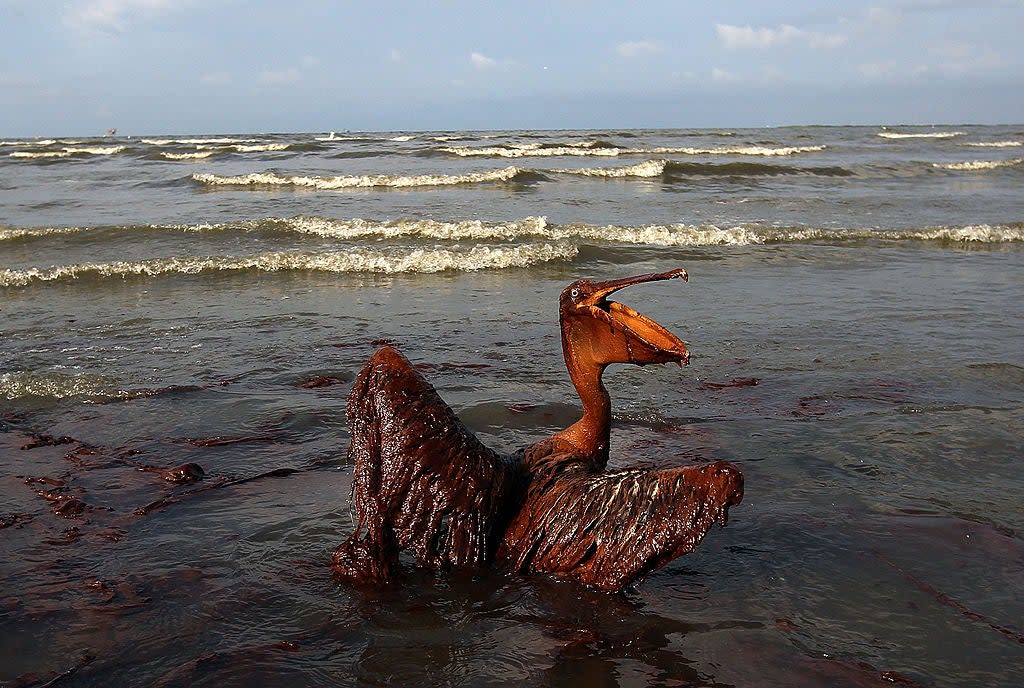A farewell favour for fossil fuel allies as Trump guts migratory bird protections

- Oops!Something went wrong.Please try again later.
The Trump administration is using its waning power to complete rollbacks on a number of environmental and climate protections including on Tuesday, protections for migratory birds.
The rule change means that the federal government will no longer fine or prosecute industries for practices that kill birds unintentionally such as oil spills, electrocutions on power lines, wind turbines that knock them from the air, and waste pits where landing birds perish in toxic water.
The US Fish and Wildlife Service acknowledged in findings last year that the rollback would have a “negative” impact on a number of species protected by the 1918 Migratory Bird Treaty Act, which range from hawks and eagles to seabirds, storks, songbirds and sparrows.
Nevertheless, during Donald Trump’s final weeks in office, his administration is plowing on with a flurry of actions that favor the president’s industry allies, including a plan to auction off oil and gas leases in the Arctic National Wildlife Refuge and others to delay protections for endangered species.
The New York Times reported that while Representative Deb Haaland, president-elect Joe Biden’s pick for interior secretary, is expected to repeal the rule, it is likely to be a slow process.
The Trump administration had pushed forward with the migratory bird rule change despite outcry from former federal officials and many scientists, who say that billions more birds will likely died as a result.
“This rule simply reaffirms the original meaning and intent of the Migratory Bird Treaty Act by making it clear that the U.S. Fish and Wildlife Service will not prosecute landowners, industry and other individuals for accidentally killing a migratory bird,” said Secretary of the Interior, David L. Bernhardt, in a statement.
The Trump administration also plowed ahead with the migratory bird regulation even after a New York federal judge rejected the administration’s legal rationale in August.
Industry operations kill between an estimated 450 million-1.1 billion birds each year, out of roughly 7 billion birds in North America, according to USFWS and recent studies.
America has lost more than one in four birds in the last 50 years, according to the Audobon Society, amounting to nearly 3 billion birds. The climate crisis is having increasing impacts on migratory bird populations.
Companies have suggested that they will continue with policies to ensure the safety of birds but environmentalists say it is a hammer blow to one of America’s oldest pieces of legislation to protect wildlife.
“This brutal blow hits America’s birds when many populations are already plummeting, so it’s really the last thing they need,” said Noah Greenwald, endangered species director at the Center for Biological Diversity.
“Trump officials are giving oil companies and other polluters a license to kill birds. Vast numbers of birds will be electrocuted by power lines, drowned in oil waste pits and killed in other easily preventable ways.
“The only good news is that the courts have the power to, once again, strike down this reckless attack on one of America’s oldest and most important conservation laws.”
Federal prosecutors have used the Migratory Bird Act sparingly with regards to the accidental killing of birds.
One of its notable uses was to reach the $100 million settlement following the 2010 Deepwater Horizon spill in the Gulf of Mexico which killed more than a million birds.
AP contributed to this report
Read More
Trump won’t be allowed to escape to Scotland before Biden inauguration
Trump told us himself: He’s lost the war on climate change
Cities around world will see humidity fall from climate crisis: study

